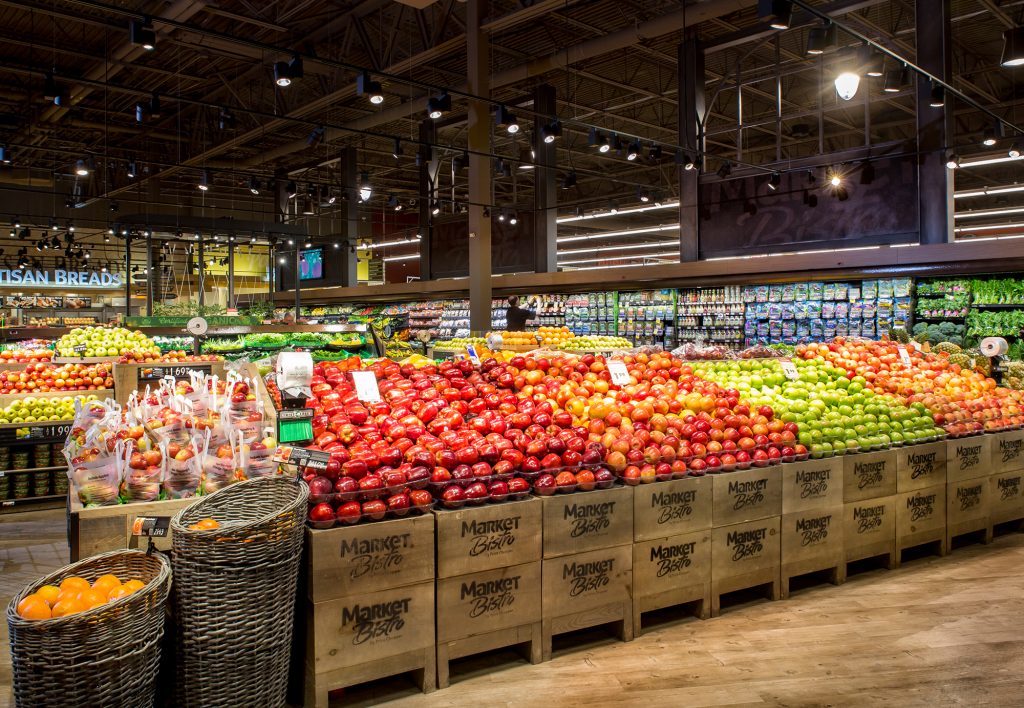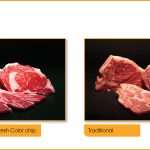Lighting Key to Enhancing Late-Day Freshness Perceptions

Editor’s Note: This article originally appeared in Progressive Grocer. See the original post here.

A recent study by the Retail Feedback Group had some bad news for grocers: Shopper satisfaction with supermarkets drops between 3 p.m. and 7 p.m. Ratings were down in several categories, including quality/freshness, cleanliness and value for money. Since these are the prime shopping hours for supermarkets, this is a problem.
But there’s a way to combat these negative afternoon perceptions, and it’s all in how grocers present fresh food. When customers buy produce or meat or fish, they want the merchandise to be bursting with freshness, exuding a “just-picked” appearance.
The key to communicating the language of fresh is color. Vibrant hues signal freshness, and light is the best way to highlight color. Getting the right light on food is crucial to delivering the message of fresh.
Let there be LED lighting
Modern LED lighting can make food look like it’s just been picked that very day. Things tend to look best in natural sunlight, and fresh food is no exception. We grow up looking at sunlight, and it’s our reference point for what good light looks like. Until now, there hasn’t been a lighting solution that could emulate the sun’s natural tones without degrading fresh food by emitting heat.
Older light technologies, such as halogen lamps, had a very warm-toned light – similar to the golden light of sunset – and would project heat and UV rays onto the merchandise. That heat would ripen fruits quickly and wilt lettuce. Staff members had to turn produce over throughout the day to protect it from the heat and UV rays from older lights. With modern LEDs, stores no longer need to hire someone to turn potatoes over so they don’t turn green.
Many supermarkets have upgraded from older halogen and ceramic metal halide lamps, but for those that haven’t, there’s never been a better time than now to make the switch. Modernizing your stores to LEDs can improve how your produce looks, as well as deliver huge energy savings.
The average 50,000-square-foot supermarket racks up more than $200,000 in energy bills annually, according to EnergyStar.gov. Since most of that expense accounts for refrigeration and lighting, energy savings from LEDs can be quite significant when operating on razor-thin margins. LEDs can reduce energy costs by up to 80 percent, compared with conventional lighting.
Newer lighting technologies fixed the heat projection problems, but didn’t master color quality, with fresh food looking flat under metal halide, fluorescent and early-generation LED lights.
Maximize the power of the perimeter
With modern LED technology, however, you can finally bring the sun into your store. The natural colors of fresh food shine under LEDs. With the lights’ outstanding color-rendering abilities, fresh food look like it was just picked when placed under LEDs.
Light falls on a spectrum, and conventional light sources emit light at fixed points along the spectrum. Since LEDs are made from electronics, they can be tuned to showcase the natural colors in fresh foods, which older light sources can’t.
For greater visual appeal, LEDs can bring out the reds in meat, emphasize the farmers’-market appearance of fruit and vegetables, and highlight the cool silver scales of fresh-caught fish. The right lights don’t change the colors of fresh food. However, they show the food’s natural colors and highlight the freshness of the product. This enhances your shoppers’ perceptions of fresh and can counteract the late-day slump identified in the Retailers Feedback Group survey.
Your perimeter aisles house your high-margin fresh food departments. Maximize the power of your perimeter with lighting that showcases the natural colors of your fresh food products with the right LED lighting.

